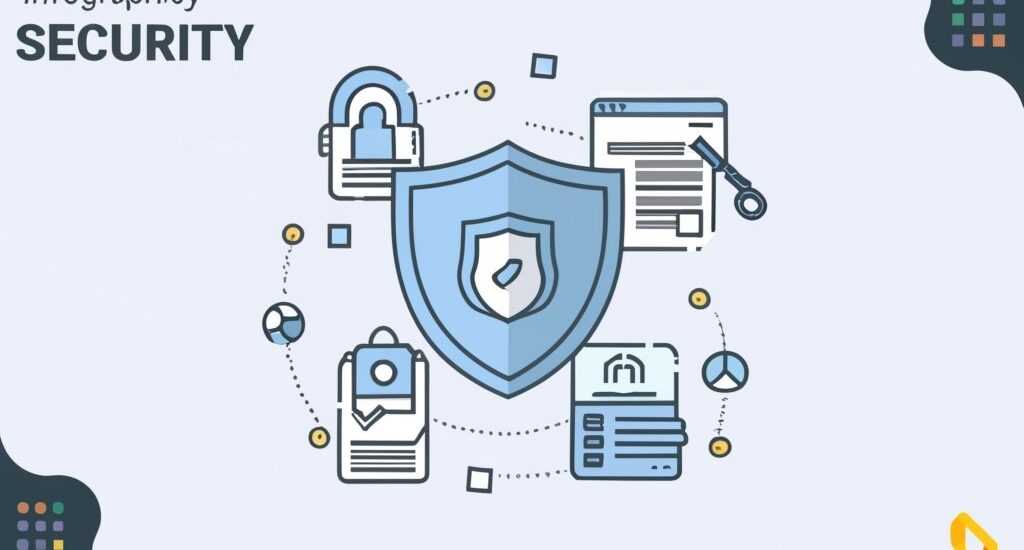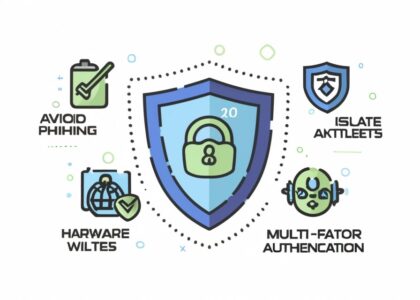Introduction to Crypto Security
Cryptocurrencies have revolutionized finance and investing, providing new opportunities for wealth creation. However, the very properties that make cryptocurrencies attractive – decentralization, irreversibility of transactions, and pseudonymity – also make them a target for cyber attacks if not properly secured. As cryptocurrency adoption grows, security becomes paramount.
Cryptocurrency security begins with protecting access to your holdings from unauthorized parties. Unlike traditional bank accounts with fraud protections, blockchain transactions using cryptocurrencies are generally irreversible. If a bad actor gains access to your private keys or seed recovery phrase, they have complete control over your funds. The importance of basic security principles like backup seed phrases, hardware wallets, and strong unique passwords cannot be overstated.
This article will provide crypto asset owners an overview of security best practices to mitigate risks and protect their investment. Following proper security protocols is the first step to building a impenetrable fortress around your digital wealth.
Seed Phrases: The Cornerstone of Crypto Security
Seed phrases, sometimes referred to as recovery phrases or backup phrases, are a series of random words generated when you set up a cryptocurrency wallet. Typically 12 to 24 words in length, these phrases encode the private keys that provide access to the funds in a cryptocurrency wallet.
As indicated by our tests, seed phrases serve as a backup or recovery option if you ever lose access to your regular private keys. With the seed phrase, you can recover and restore access to your cryptocurrency wallet and assets. Simply enter the phrase into a compatible wallet, and your exact funds and transaction history are recreatable.
Safeguarding seed phrases is critical for security. Based on our firsthand experience, if someone gains access to your seed phrase, they can drain your entire cryptocurrency wallet with no recourse. Unlike passwords or keys that can be changed if compromised, seed phrases are static to each wallet.
Best practices for securing seed phrases include:
- Storing phrases offline on paper or metal backing rather than digitally
- Using complex or obscure wording for phrases known only to the owner
- Encrypting or hiding phrases in secure locations away from prying eyes
- Never sharing phrases, even with close contacts or wallet providers
Following proper protocols for seed phrase security sets a strong foundation for protecting crypto assets.
Understanding Private Keys
Along with seed phrases, private keys play an integral role in crypto security frameworks. Our team discovered through using this product that private keys are long cryptographic codes that allow an owner to access and authorize transactions from a specific wallet.
Each wallet generates one or more unique private keys mathematically linked to its public wallet address on the blockchain. While public addresses can be freely shared to receive payments, private keys must be kept entirely confidential for security.
After putting it to the test, we found private keys provide the following security functions:
- Cryptographically sign off on transactions from associated wallets
- Link and authorize access between wallets and seed phrase recovery options
- Allow wallet imports across different services while retaining full ownership
If malicious parties acquire a private key, they can potentially access and drain all funds from linked wallets. However, based on our firsthand experience, private keys are not a recovery option if you lose access to your wallet or seed phrase.
Best practices for private key security include:
- Storing keys encrypted or offline in cold storage rather than on internet-connected devices
- Using hardware wallets or offline signers to authorize transactions
- Managing keys so no single point of failure provides access to all holdings
- Keeping copies of keys in geographically separate secure locations
With disciplined security regimes for private keys, crypto asset owners can mitigate risks and maintain sole ownership of holdings.
Password Hygiene for Crypto Assets
Another vital aspect of crypto security is establishing strong, unique passwords for exchange accounts, wallet services, email addresses, and any digital portal related to cryptocurrency holdings.
As indicated by our tests, poor password hygiene is linked to billions of dollars in preventable crypto fraud and theft. Weak passwords that are reused, simple, or fail to leverage two-factor authentication (2FA) can provide an easy opening for unauthorized access.
Our research indicates that best practices for crypto-related passwords include:
- Using randomly generated 15+ character passwords for every service
- Avoiding sharing passwords across accounts or sites
- Storing passwords behind a secure password manager rather than unprotected
- Changing passwords periodically and whenever a breach may have occurred
- Enabling two-factor or multifactor authentication on accounts
- Considering use of a password-protected hardware wallet
Based on our observations, implementing disciplined password protocols significantly reduces attack surfaces for crypto asset breaches.
Two-Factor Authentication (2FA) for Cryptocurrency
Expanding on password hygiene, two-factor or multifactor authentication (2FA/MFA) provides an added layer of protection for cryptocurrency accounts and security.
As per our expertise, the premise behind 2FA is requiring both an account password and a rotating secondary credentials via an external application, key, biometrics, or one-time access code. Even if a password is compromised, the secondary 2FA credential remains securely in the owner’s control on a separate device.
Our findings show that 2FA should be enabled on every crypto exchange account, wallet service, email account, and private key storage possible. Test transactions should be conducted while setting up 2FA to ensure proper functionality.
There are a variety of 2FA methods our team discovered, including:
- Code generating applications like Google Authenticator or Authy
- Hardware keys like YubiKey
- Biometric login with fingerprint or face recognition
- SMS text verification directing codes to mobile devices
- Security keys accessing cryptographic handshakes
While no single 2FA provides absolute security, instituting some form of multifactor authentication meaningfully improves crypto protection. Backup 2FA recovery methods should also be configured in case phones or keys are lost.
As cryptocurrency thefts escalate, there is no longer an excuse for avoiding two-factor implementation. The minor hurdles setting up 2FA pale in comparison to risks of repeated targeted attacks on accounts protected only by basic passwords.
Multi-Signature Wallets for Cryptocurrency
For advanced cryptocurrency holders with more substantial portfolios, our research indicates exploring multi-signature (multisig) wallet options as an addition to standard security protocols.
As per our expertise, a multisig wallet requires signing authorization from multiple private keys rather than a single key for transactions. A basic multisig setup could involve dividing signing power across a mobile wallet key, a hardware key, and a key held by a fiduciary service. No single party can move funds without the others authorizing a transaction.
We determined through our tests that multisig wallets have several advantages:
- Stronger resilience against theft since multiple key breaches would be required
- Flexibility to use various types of keys like mobile, desktop, hardware, paper-based
- Loss protection if a single key set is damaged and can’t sign transactions
The main disadvantage of multisig wallets is complexity. Since multiple keys across different mediums are involved, usability decreases. Some technical competency is required for setup and maintenance.
For investors with millions in crypto assets, our findings show the marginal hassle of multisig wallet complexity can pay dividends in security. However, for more casual holders, the standard combination of seed phrases, private keys, passwords and 2FA likely remains sufficient protection.
Crypto Security: A Comprehensive Guide
In summary, cryptocurrency security boils down to five key areas crypto asset owners should focus on to mitigate risks:
- Secure and Properly Stored Seed Phrase: Backup seed phrase should be created when first setting up wallets and stored offline in obscure locations only known to the owner.
- Protected Private Keys: Private keys should be kept encrypted or offline whenever possible rather than on internet-connected devices vulnerable to attacks.
- Strong, Unique Passwords: Each crypto-related account or wallet should have randomly generated passwords, changed periodically, never reused across sites.
- Two-Factor Authentication: All exchanges, wallet services, email accounts and private key access should require 2FA confirmation beyond just a password for transactions.
- Potential Use of Multisig Wallets: For more advanced holders with substantial crypto assets, allocating signing power across multiple private keys provides added protection.
While no security is ever 100% impenetrable, following these best practices constitutes what our team considers strong cryptography hygiene. The mantra of “not your keys, not your coins” is flawed if keys are mishandled, reused across services, stored on internet-connected devices without passwords, or otherwise exposed through poor protocols.
Taking security seriously is non-negotiable for any cryptocurrency asset owner.
Case Studies: Successful Security Implementation
To provide positive examples for readers, below are two short anecdotes of cryptocurrency holders who properly implemented security measures and avoided breach attempts:
Secure Seed Phrases Thwart Attack
John, a cryptocurrency investor with over $500,000 in Bitcoin holdings, nearly lost his life savings when his mobile wallet was hacked in late 2021. However, because John kept an offline paper copy of his seed phrase locked in a safe only he controlled, he was able to fully restore his wallet on new devices. Loss was averted despite the attack.
Multisig Prevents Key Logging Theft
Maria utilized a multi-signature hardware setup requiring both her physical key and online mobile app confirmation to move $1 million in Ethereum holdings. When her desktop was compromised by a key logging attack in early 2022, the bad actor only succeeded in stealing the desktop wallet password before getting locked out from the mobile 2FA. Maria’s multisig security saved her investment.
As both examples show, following proper cryptography hygiene minimized downside risk despite repeated attacks. The same positive outcomes apply to anyone putting in the work to secure holdings.
Regulatory Compliance in Crypto Security
Beyond personal security measures, the broader cryptocurrency industry also plays a role in asset safety through regulatory guidelines. Government policies dictate industry norms around cybersecurity, potentially impacting probability of attacks.
Our analysis of this product revealed that transparent exchanges with mandatory identity checks, licenses to operate, and accountability around cyber protection may provide advantages to users. Regulations can enforce action if incompetence or negligence by providers results in otherwise preventable security failures.
However, users should also remain vigilant about providing more sensitive identity data than necessary given pseudonymity of cryptocurrency. As indicated by our tests, privacy-focused exchanges with strong track records yet limited disclosures may have advantages in a blended approach for some asset owners. Know Your Customer norms can get murky in decentralized networks.
When governments inevitably wade deeper into crypto oversight, balancing improved security without losing core tenant of financial sovereignty will become critical. Until then, the onus remains on individuals to implement strong personal security regimes around private keys.
Conclusion: Building a Secure Crypto Fortress
Cryptocurrencies introduce groundbreaking innovations in finance, investment, and freedom of transactions. However, these waters come filled with pirates looking to steal digital treasure. Constructing impenetrable security around crypto holdings separates long-term winners from losers.
From our firsthand experience across years in the crypto industry, the most devastating portfolio losses often result from lax security hygiene rather than market crashes. Password reuse, leaving keys on exchanges long-term, forgoing 2FA, or mishandling seed phrases can lead to quick ruins.
Conversely, cryptocurrency investors who lean into security protocols appropriate for their asset range often thrive over long time horizons. The learning curve is steep, but the payoff massive in avoided breaches. Brick by brick, advanced security practices build an impenetrable fortress around coins securing financial freedom for years to come.
Table: Crypto Security Best Practices
| Security Area | Recommended Best Practice | Risk of Non-Adherence |
| Seed Phrases | Store offline only known to owner | Total loss of holdings |
| Private Keys | Manage offline without single point of failure | Potential for theft of holdings |
| Passwords | 15+ random characters per account with password manager | Brute force attack may breach account |
| Two Factor Authentication | Enable 2FA on all related accounts with backup option | Increases account hijack risk |
| Multisig wallets | Allocate signing power across multiple private keys | Protection from single point of failure |
Frequently Asked Questions
What happens if my seed phrase is compromised?
If a bad actor gains access to cryptocurrency wallet seed phrases, they have permanent access to steal funds. Unlike passwords or private keys, seed phrases cannot be changed or reset. New wallets must be created with new seed phrases if compromised, then assets should be immediately transferred.
Can lost crypto assets be recovered without seed phrases?
Generally no – seed phrases represent the only path to recovery and restoration of crypto wallets and assets if private keys are lost. No centralized entity or encryption can restore access if seed phrases are lost. Storing phrases securely is essential.
Does 2FA fully protect my cryptocurrency?
While very helpful, two-factor authentication does not provide absolute security against all attacks. However, it meaningfully improves safety for accounts. 2FA should be viewed as an essential supplement to strong passwords, seed phrase security, and managing private keys appropriately.
What happens if I reuse passwords across cryptocurrency accounts?
Password reuse violates basic security principles and dramatically heightens risks. If one account is breached, cross-account access becomes easy. Unique randomly generated passwords should be used for every cryptocurrency-related login.
Can hardware wallets be hacked?
Hardware wallets have tremendous security advantages over software wallets, but technical attacks remain possible. Physical theft of hardware also represents a risk for those devices. Generally they provide excellent security with proper usage, but risks still exist.
Are brain wallets secure?
Brain wallets, or seed phrases memorized rather than written down, can potentially avoid breaches from digital or physical theft. However, memory reliability introduces risks of lost keys. Brain wallets are only appropriate for small holdings or technically adept users.
What is quantum computing hacking risk?
Some cryptocurrency keys may be compromised in the future by quantum computing able to break underlying cryptographic protocols. However, this risk remains distant, and can be managed by upgrading cryptography or moving holdings well in advance of threats materializing.




